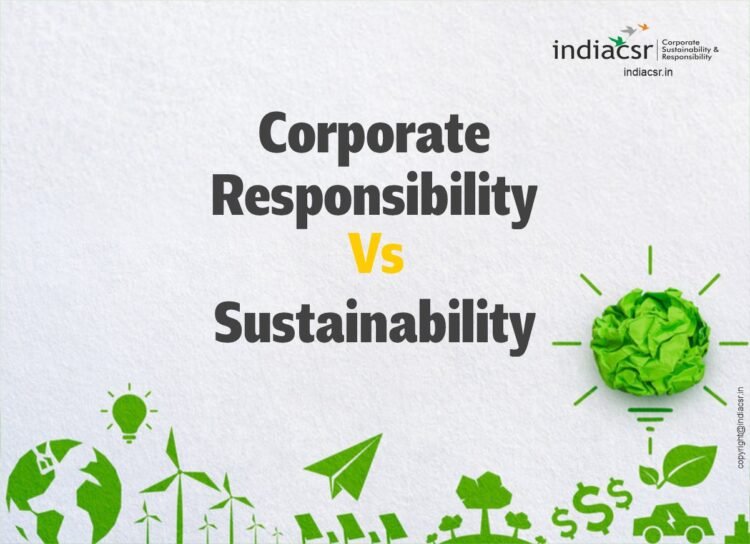Corporate Responsibility and Sustainability are crucial aspects of a company’s overall approach to ethical and sustainable business practices.
Corporate Responsibility and Sustainability are two critical concepts in modern business. They guide companies to act ethically and responsibly. While they overlap, they are not the same. Corporate Responsibility covers ethical business practices, social impacts, and community engagement. Sustainability focuses on long-term environmental stewardship and resource management. Understanding their differences helps businesses integrate both principles to foster ethical, sustainable growth and create a positive impact on society and the planet.
Corporate Responsibility (CR) and Sustainability are related but distinct concepts in the realm of business practices and ethics. Here’s a breakdown of their similarities and differences:
Corporate Responsibility (CR)
Definition: Corporate Responsibility refers to a company’s commitment to conduct its business in an ethical way. This includes managing the social, environmental, and economic impacts of its operations responsibly.
Key Areas
Ethical Business Practices: Ensuring fair treatment of employees, ethical sourcing, and honest marketing.
Community Engagement: Supporting local communities through philanthropy, volunteering, and social programs.
Environmental Stewardship: Reducing environmental impact through waste management, energy efficiency, and sustainable sourcing.
Economic Responsibility: Contributing to economic development while improving the quality of life for the workforce and their families.
| Ethical Business Practices | Fair treatment of employees, ethical sourcing, honest marketing |
| Community Engagement | Philanthropy, volunteering, social programs |
| Environmental Stewardship | Waste management, energy efficiency, sustainable sourcing |
| Economic Responsibility | Economic development, improving workforce quality of life |
Examples of Corporate Responsibility
Here are five examples of Corporate Responsibility (CR):
- Environmental Sustainability: Companies like Patagonia have committed to reducing their environmental footprint by using recycled materials in their products and investing in renewable energy sources.
- Fair Labor Practices: Starbucks, for instance, ensures fair trade practices by paying coffee growers equitable wages, promoting safe working conditions, and prohibiting child labor.
- Community Development: Google’s parent company, Alphabet, invests in local communities through its Grow with Google initiative, which provides free training and tools to help people grow their skills, career, or business.
- Philanthropy: Microsoft, through its philanthropic arm, donates billions in cash, services, and software to non-profit organizations worldwide to help solve societal problems.
- Ethical Sourcing: Companies like Apple have strict supplier responsibility standards, ensuring that materials for their products are ethically sourced, and workers involved in the supply chain are treated fairly.
******
Sustainability
Definition: Sustainability focuses specifically on meeting the needs of the present without compromising the ability of future generations to meet their own needs. It is often centered on the long-term environmental impact of business operations.
Key Areas
- Environmental Protection: Initiatives to reduce carbon footprint, manage natural resources sustainably, and prevent pollution.
- Social Equity: Ensuring fair treatment and opportunities for all stakeholders, including future generations.
- Economic Viability: Creating business models that are economically viable in the long term without degrading environmental or social resources.
| Environmental Protection | Reduce carbon footprint, sustainable resource management, prevent pollution |
| Social Equity | Fair treatment and opportunities for all stakeholders |
| Economic Viability | Long-term viable business models without degrading resources |
Examples of sustainability
Here are five examples of sustainability:
- Renewable Energy: Companies like Tesla are leading the way in the production of electric vehicles and solar energy products, reducing reliance on fossil fuels.
- Sustainable Agriculture: Organic farming practices, such as those used by many local farms, avoid harmful pesticides and genetically modified organisms (GMOs), promoting biodiversity and soil health.
- Water Conservation: Cities like Cape Town, South Africa, have implemented strict water usage policies to manage their water resources sustainably.
- Waste Reduction: Companies like Patagonia promote a “repair, reuse, recycle” philosophy, encouraging customers to repair their gear, buy used, and recycle their products when they’re no longer usable.
- Green Building: The construction industry is adopting sustainable practices like using energy-efficient materials, reducing waste, and minimizing environmental impact during construction.
*****
Differences
- Scope: While sustainability is often more focused on environmental issues and long-term impacts, corporate responsibility encompasses a broader range of ethical practices, including social and economic responsibilities.
- Focus: Sustainability emphasizes creating systems that support long-term ecological balance. Corporate Responsibility includes this but also focuses on immediate social and ethical business practices.
- Approach: Corporate Responsibility may include initiatives like corporate philanthropy and community engagement, which are not always the focus of sustainability efforts.
| Scope | Broader range of ethical practices | Focus on environmental issues and long-term impacts |
| Focus | Immediate social and ethical practices | Systems for long-term ecological balance |
| Approach | Includes philanthropy and community engagement | Primarily focused on environmental sustainability |
Here’s an analogy
Think of a house. Corporate Responsibility is like ensuring the house is right place, well-maintained, clean, and safe for its occupants. Sustainability is about making sure the house is built on solid foundations, uses energy efficiently, and can withstand storms, so it remains habitable for generations to come.
| Concept | House Analogy |
|---|---|
| Corporate Responsibility | Well-maintained, clean, and safe for occupants |
| Sustainability | Solid foundations, energy-efficient, withstands storms |
Similarities
Corporate Responsibility (CR) and Sustainability, both concepts, aim to promote ethical business practices.
They encourage companies to consider the broader impact of their operations on society and the environment.
Both require companies to go beyond mere compliance with laws and regulations, striving for positive impacts.
(India CSR)







